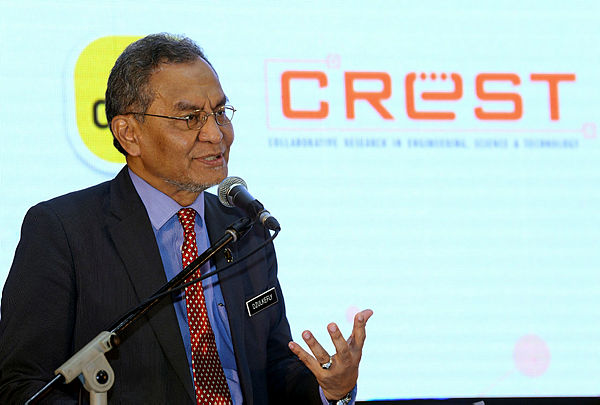CYBERJAYA: The provision of free pneumococcal vaccines for children next year is still in the discussion stage said Health Minister Datuk Seri Dr Dzulkefly today.
Dzulkefly said the ministry will look into the provision according to the budget. It will also determine who should receive it and will prioritise the free vaccines for the high risk group.
“For the amount that we are given (budget), we must strategise as to how best we can get the provision implemented by 2020. We have got to be calculative, reasonably, as to what is possible, considering the budget. And hopefully we can work towards a better budgetary allocation for coming years,“ he told the press after officially launching the CREST Digital Healthcare Cluster and the Healthcare Advisory Panel today.
“We asked for something slightly more than RM120 million but we were only given about half (the amount). It will be something for the ministry and the health director-general Datuk Dr Noor Hisham Abdullah to work out and strategise because it looks like we will not have the ability to vaccinate the entire cohort, totalling some 450 to 500 thousand a year,“ he said. However, Dzulkefly added that the ministry will find a way to implement the free vaccination by next year.
Meanwhile, Dzulkefly lauded Prime Minister and the Finance Minister for the budget allocated to his ministry.
Last Friday, Finance Minister Lim Guang Eng announced an allocation of RM30.6 billion for the Health Ministry, out of which RM60 million will be set aside for the vaccine, as a start.
However, Noor Hisham informed that the ministry is in the midst of renegotiating with respective companies on lowering the cost of the vaccine so as to increase the numbers of those who can receive it for free.
“Now that we have the volume and numbers, we can actually renegotiate with respective companies to bring down the price and this is a good start as we have around 200 to 300 patients now, who are affected,“he said.
He informed that families who can afford the vaccine at private clinics or hospitals pay RM300 per jab and over RM1,000 for the full course.
On if the vaccination should made compulsory, Dzulkefly said the ministry wants to reach out to the pockets of community who are under served in remote areas before making a decision if it should be made mandatory.
“We have to look into this issue of compulsory vaccination thoroughly. I think with a little bit of time, as much as we want every child to be vaccinated, or at least to achieve 95% immunity, we need to see what kind of vaccine there is,“ he said.
“But I must say we also need to look at this judiciously because there are downsides to the implication in making it mandatory,“ he said.
“We must achieve reaching the unreachable first before we can make it compulsory.
“Besides, we need to address and reach out to the under served communities in remote areas first,” he said.
Meanwhile, Dzulkefly pointed out that the ministry is going to kick-off the Electronic Medical Records (EMR) system in the second quarter of next year.
“We have already crossed two stages - the internal evaluations of this strategy and financial solutions. And we now have identified companies and need to short list them. We are moving to the external evaluation stage now,“ he informed.
With EMR, the efficiency and organisation of patients’ medical information will improve. The system will also help reduce time and manual effort spent on accessing patients’ information.
“The EMR will allow patient information to be shared quickly and easily among various touch points in the healthcare system,“ he explained.
He cited patient records shared between private clinics and hospitals, and even among post care practitioners such as physiotherapists, something which was thoroughly inhibited by a lengthy and cumbersome process before.
“The accuracy of EMR can greatly impact the efficiency of public hospitals in Malaysia, from scheduling to consultation of diagnoses and medication, leading to less congestion in public hospitals.“
Dzulkefly said that this can make an impact in freeing up resources and making healthcare more affordable and accessible as diagnosis and follow up consultation can be efficiently done. The EMR system can even anticipate and calculate the needs of individual patients.














